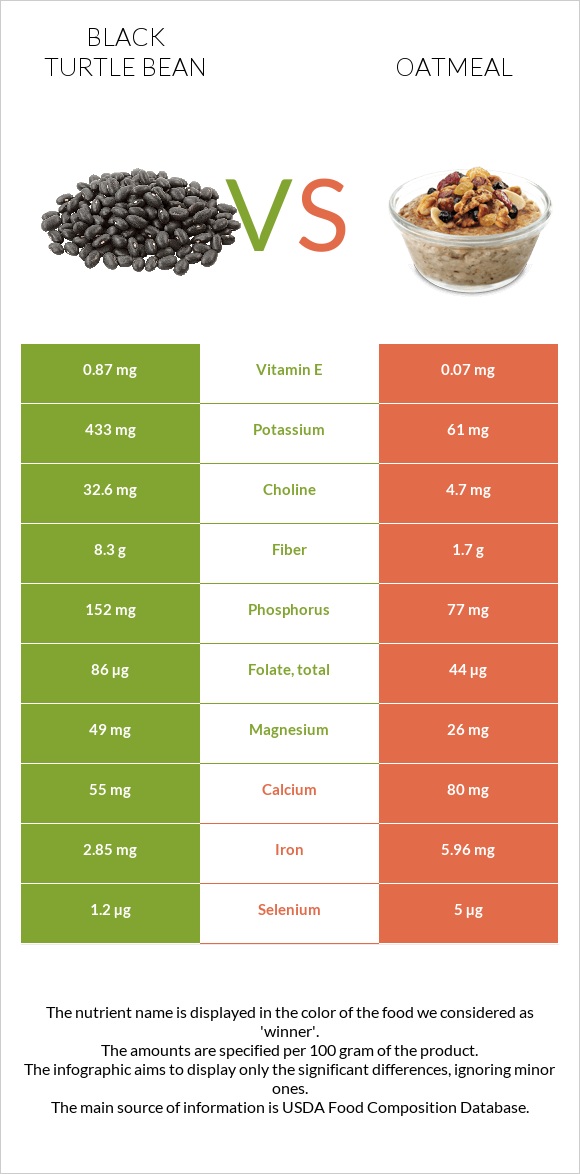Black turtle bean vs. Oatmeal — In-Depth Nutrition Comparison
Compare
Significant differences between black turtle bean and oatmeal
- Black turtle bean has more fiber, copper, potassium, phosphorus, and folate; however, oatmeal is richer in iron, vitamin B6, vitamin B3, vitamin B2, and manganese.
- Oatmeal covers your daily iron needs 39% more than black turtle bean.
- Oatmeal has 7 times less potassium than black turtle bean. Black turtle bean has 433mg of potassium, while oatmeal has 61mg.
- Oatmeal has a higher glycemic index. The glycemic index of oatmeal is 79, while the glycemic index of black turtle bean is 20.
Specific food types used in this comparison are Beans, black turtle, mature seeds, cooked, boiled, without salt and Cereals, oats, instant, fortified, plain, prepared with water (boiling water added or microwaved).
Infographic

Infographic link
Mineral Comparison
Mineral comparison score is based on the number of minerals by which one or the other food is richer. The "coverage" charts below show how much of the daily needs can be covered by 300 grams of the food.
| Contains more MagnesiumMagnesium | +88.5% |
| Contains more PotassiumPotassium | +609.8% |
| Contains more CopperCopper | +307.6% |
| Contains more ZincZinc | +22.6% |
| Contains more PhosphorusPhosphorus | +97.4% |
| Contains less SodiumSodium | -93.9% |
| Contains more CalciumCalcium | +45.5% |
| Contains more IronIron | +109.1% |
| Contains more ManganeseManganese | +70.6% |
| Contains more SeleniumSelenium | +316.7% |
Vitamin Comparison
Vitamin comparison score is based on the number of vitamins by which one or the other food is richer. The "coverage" charts below show how much of the daily needs can be covered by 300 grams of the food.
| Contains more Vitamin EVitamin E | +1142.9% |
| Contains more Vitamin KVitamin K | +725% |
| Contains more FolateFolate | +95.5% |
| Contains more Vitamin AVitamin A | +∞% |
| Contains more Vitamin B1Vitamin B1 | +15.6% |
| Contains more Vitamin B2Vitamin B2 | +283.9% |
| Contains more Vitamin B3Vitamin B3 | +474% |
| Contains more Vitamin B5Vitamin B5 | +21.9% |
| Contains more Vitamin B6Vitamin B6 | +276.6% |
All nutrients comparison - raw data values
| Nutrient |  |
 |
DV% diff. |
| Iron | 2.85mg | 5.96mg | 39% |
| Fiber | 8.3g | 1.7g | 26% |
| Copper | 0.269mg | 0.066mg | 23% |
| Vitamin B3 | 0.527mg | 3.025mg | 16% |
| Vitamin B6 | 0.077mg | 0.29mg | 16% |
| Vitamin A | 0µg | 130µg | 14% |
| Protein | 8.18g | 2.37g | 12% |
| Vitamin B2 | 0.056mg | 0.215mg | 12% |
| Potassium | 433mg | 61mg | 11% |
| Phosphorus | 152mg | 77mg | 11% |
| Folate | 86µg | 44µg | 11% |
| Manganese | 0.327mg | 0.558mg | 10% |
| Selenium | 1.2µg | 5µg | 7% |
| Magnesium | 49mg | 26mg | 5% |
| Vitamin E | 0.87mg | 0.07mg | 5% |
| Choline | 32.6mg | 4.7mg | 5% |
| Carbs | 24.35g | 11.67g | 4% |
| Starch | 10.37g | 4% | |
| Calories | 130kcal | 68kcal | 3% |
| Calcium | 55mg | 80mg | 3% |
| Vitamin B1 | 0.225mg | 0.26mg | 3% |
| Fats | 0.35g | 1.36g | 2% |
| Sodium | 3mg | 49mg | 2% |
| Vitamin K | 3.3µg | 0.4µg | 2% |
| Polyunsaturated fat | 0.149g | 0.426g | 2% |
| Zinc | 0.76mg | 0.62mg | 1% |
| Vitamin B5 | 0.26mg | 0.317mg | 1% |
| Saturated fat | 0.089g | 0.226g | 1% |
| Monounsaturated fat | 0.03g | 0.391g | 1% |
| Net carbs | 16.05g | 9.97g | N/A |
| Sugar | 0.32g | 0.46g | N/A |
| Trans fat | 0g | 0.003g | N/A |
| Tryptophan | 0.097mg | 0.04mg | 0% |
| Threonine | 0.344mg | 0.083mg | 0% |
| Isoleucine | 0.361mg | 0.105mg | 0% |
| Leucine | 0.653mg | 0.2mg | 0% |
| Lysine | 0.562mg | 0.135mg | 0% |
| Methionine | 0.123mg | 0.04mg | 0% |
| Phenylalanine | 0.442mg | 0.13mg | 0% |
| Valine | 0.428mg | 0.151mg | 0% |
| Histidine | 0.228mg | 0.057mg | 0% |
Macronutrient Comparison
Macronutrient breakdown side-by-side comparison
Protein:
8.18 g
Fats:
0.35 g
Carbs:
24.35 g
Water:
65.74 g
Other:
1.38 g
Protein:
2.37 g
Fats:
1.36 g
Carbs:
11.67 g
Water:
84.03 g
Other:
0.57 g
| Contains more ProteinProtein | +245.1% |
| Contains more CarbsCarbs | +108.7% |
| Contains more OtherOther | +142.1% |
| Contains more FatsFats | +288.6% |
| Contains more WaterWater | +27.8% |
Fat Type Comparison
Fat type breakdown side-by-side comparison
Saturated fat:
Sat. Fat
0.089 g
Monounsaturated fat:
Mono. Fat
0.03 g
Polyunsaturated fat:
Poly. Fat
0.149 g
Saturated fat:
Sat. Fat
0.226 g
Monounsaturated fat:
Mono. Fat
0.391 g
Polyunsaturated fat:
Poly. Fat
0.426 g
| Contains less Sat. FatSaturated fat | -60.6% |
| Contains more Mono. FatMonounsaturated fat | +1203.3% |
| Contains more Poly. FatPolyunsaturated fat | +185.9% |





